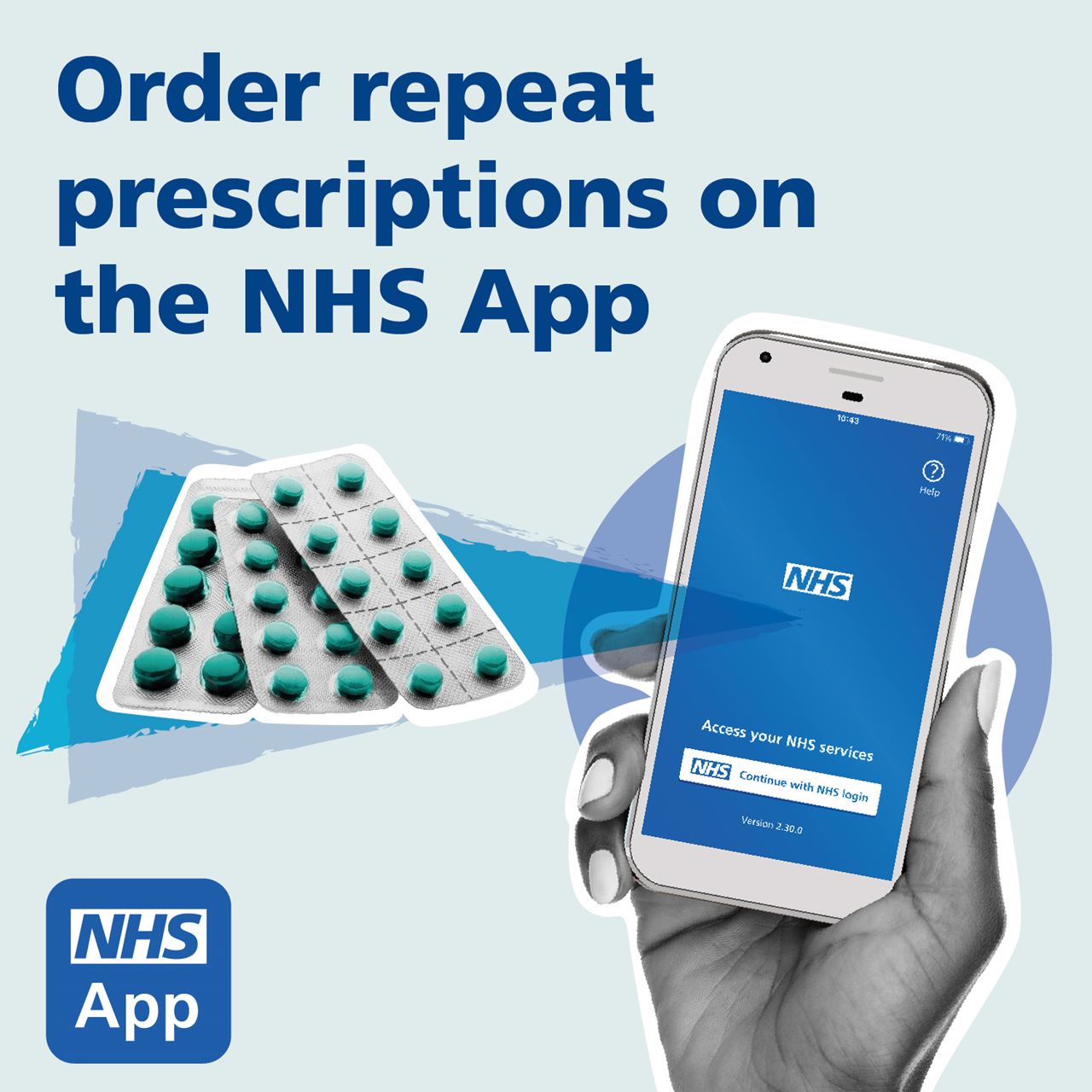Prescriptions
Ordering repeat prescriptions
The easiest ways to order repeat prescriptions are:
- Using your NHS account (through the NHS website or in the NHS App)
- Using the GP online system: SystmOnline
- Using Online consultation tool - Accurx
These accounts show you all your repeat medicine and dosage and you can choose the ones you need.
You can also:
- Fill out a repeat prescriptions request form
- Bring the paper form to the surgery, Monday to Friday from 8:00am to 6.30pm
We do not take repeat prescription requests over the phone or email.
Please allow at least 48 hours after submitting your request before collecting your prescription from the surgery.
Collecting your prescription
You can usually collect your prescription from the pharmacy 3 to 5 working days after you have ordered it.
You will need to choose a pharmacy to collect your prescription from. We call this nominating a pharmacy.
You can change your nominated pharmacy at any time:
- Online where you order your repeat prescriptions
- At your GP practice
- At any pharmacy that accepts repeat prescriptions
Questions about your prescription
If you have questions about your medicine, your local pharmacists can answer these. They can also answer questions on medicines you can buy without a prescription.
The NHS website has information on how your medicine works, how and when to take it, possible side effects and answers to your common questions.
> Go to medicines A to Z (nhs.uk)
If you would like to speak to someone at the GP surgery about your prescription:
- Phone the practice after 10am on 0121 770 4484
Medication reviews
If you have a repeat prescription, we may ask you to come in for a regular review. We will be in touch when you need to come in for a review.

View your prescriptions in the NHS App
Electronic Presciptions
You can now see and access your prescriptions electronically in the NHS App, allowing you to:
- easily see the details of medicines/ items healthcare professionals have confirmed for you
- use a prescription barcode to collect your medicine if you don’t have a nominated pharmacy, without needing to collect a paper prescription
For help and support, visit prescriptions in the NHS App or for a walk through video please visit https://digital.nhs.uk/services/nhs-app/toolkit/walk-through-videos#top
About Pharmacists
As qualified healthcare professionals, they can offer advice on minor ilnesses such as
- Coughs
- Colds
- Sore throats
- Tummy Trouble
- Aches and pains
They can also advise on medicine that you can buy without a prescription.
Many pharmacies are open until late and at weekends. You do not need an appointment.
Most pharmacies have a private consultation room where you can discuss issues with pharmacy staff without being overheard.
What to do with old medicines
Take it to the pharmacy you got it from or bring it in to the surgery. Do not put it in your household bin or flush it down the toilet.
FEAR OF FLYING
Patients come to us, asking us to prescribe diazepam for fear of flying. There are a number of very good reasons why prescribing this drug is not recommended.
1) Diazepam is a sedative, which means it makes you sleepy and more relaxed. If there is an emergency during the flight it may impair your ability to concentrate, follow instructions and react to the situation. This could have serious safety consequences for you and those around you.
2) Sedative drugs can make you fall asleep, however when you do sleep it is an unnatural non-REM sleep. This means you won’t move around as much as during natural sleep. This can cause you to be at increased risk of developing a blood clot (DVT) in the leg or even the lung. Blood clots are very dangerous and can even prove fatal. This risk is even greater if your flight is greater than 4 hours.
3) Whilst most people find benzodiazepines like diazepam sedating, a small number have paradoxical agitation and in aggression. They can also cause disinhibition and lead you to behave in a way that you would not normally. This could impact on your safety as well as that of other passengers and could also get you into trouble with the law.
4) According to the prescribing guidelines doctors follow (BNF) Benzodiazepines are contraindicated (not allowed) in treating phobia. Your doctor would be taking a significant legal risk by prescribing against these guidelines. They are only licensed short term for a crisis in generalised anxiety. If this is the case, you should be getting proper care and support for your mental health and not going on a flight.
5) Diazepam and similar drugs are illegal in a number of countries. They may be confiscated or you may find yourself in trouble with the police.
6) Diazepam stays in your system for quite a while. If your job requires you to submit to random drug testing you may fail this having taken diazepam.
We appreciate that fear of flying is very real and very frightening. A much better approach is to tackle this properly with a Fear of Flying course run by the airlines. I have listed a number of these below.
Easy Jet www.fearlessflyer.easyjet.com
British Airways http://flyingwithconfidence.com/courses/venues/glasgow
Virgin https://www.flyingwithoutfear.co.uk/fear-of-flying-courses/adult-course/
Please go to our website for an extremely good advice leaflet on managing fear of flying.
POLICY REGARDING PRESCRIBING SEDATIVES
Bosworth Medical Group does not provide sedation for medical procedures, scans, Dental work or MRI’s for the following reasons:
- Small doses of benzodiazepines such at 2mg diazepam are probably sub-therapeutic for most adults for any effective sedation. Conversely anxiolytics can have an idiosyncratic response in patients, and even very small doses can cause increased agitation in some subsets of patients.
- A patient may take a sedative 'an hour' before their assumed procedure, to then attend the hospital to find their procedure has been delayed, therefore the timing of the anxiolytic being sub optimal.
- GPs are not regularly involved, skilled, trained or appraised in sedation skills.
- All hospital consultants, both those requesting imaging and those providing it, have access to the same prescribing abilities as GPs. If a patient needs a certain medication to enable an investigation to go ahead, they are just as well positioned to provide a prescription, either through the hospital pharmacy or a hospital FP10.
- Sedated patients should be regularly monitored, and we have been made aware of a case where a GP-provided sedative was given, the patient not monitored, and subsequently had a respiratory arrest in an MRI machine.
- The Royal College of Radiologists‘ own guidelines on sedation for imaging makes no mention of GP involvement or provision of low dose anxiolytics and stresses the importance of experienced well trained staff involved and the monitoring of sedated patients: https://www.rcr.ac.uk/sites/default/files/publication/Safe_Sedation.pdf
https://rcoa.ac.uk/sites/default/files/documents/2022-06/12-SedationExp2021web.pdf
If you feel you require sedation, please liaise directly with the team who are undertaking the procedure. They are responsible for providing this.
Prescription Fees
Help with NHS costs
In England, around 90% of prescription items are dispensed free. This includes exemptions from charging for those on low incomes, such as:
- those on specific benefits or through the NHS Low Income Scheme
- those who are age exempt
- those with certain medical conditions
- More information is available at NHS Choices
NHS Charges
These charges apply in England only. In Northern Ireland, Scotland and Wales prescriptions are free of charge.
- Prescription (per item): £9.90
- 12-month prepayment certificate (PPC): £114.50
- 3-month PPC: £32.05
- Hormone Replacement Therapy Prepayment Cert: £19.80
If you will have to pay for four or more prescription items in three months or more than 14 items in 12 months, you may find it cheaper to buy a PPC.
- Telephone advice and order line 0845 850 0030
- General Public - Buy or Renew a PPC On-line
There is further information about prescription exemptions and fees on the NHS website.
Page created: 26 November 2021
